Girl Band – The long-awaited arrival of The Talkies
“Because we were away and not active in a public sense, it just removed any sense of outside pressure”
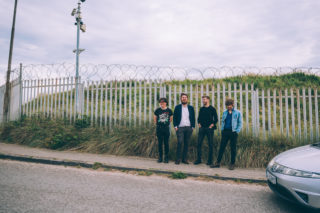
“Because we were away and not active in a public sense, it just removed any sense of outside pressure”
“And there’s the shit,” announces Ruth the photographer, almost proudly, pointing out of the window to a huge pool of open sewage water that we drive past, arriving ever closer to the beach-cum-industrial site of Poolbeg Quay for Girl Band’s photo shoot. “Is this the first place you thought of when you heard our music?” asks the band’s producer and bassist Daniel Fox with joking incredulity as we glide past the overflowing and incredibly pungent river of excrement.
As Girl Band stand around somewhat awkwardly in front of the open water, crumbling walls and storage containers, they realise it’s been a while since their last photo shoot and they’re a little rusty. In fact, it’s been a while since their last anything. Their last album – ferocious debut Holding Hands With Jamie – was released in 2015 and both their last gig and photo shoot were back in 2017.
It’s been a fragmented few years for the band. They were forced to cancel several shows due to health reasons, and given the openness with which singer Dara Kiely had previously spoken about his ongoing issues with mental health it left some wondering if the proper return of the band will ever happen. The band’s debut, and ensuing interviews, spoke candidly about the difficult period Kiely had been through: when we spoke in 2015 for issue 71 of Loud And Quiet he told me how he went from “pure highs to crippling lows”, staying up for a week straight, spending months in hospital, living in a tent for a while and even undergoing a temporary delusional state in which he thought he was God. The lyrics on the album were a direct reflection of this too: “Well, you’re not God mate and your mother’s scared,” he expelled on ‘The Last Riddler’. And on ‘Pears For Lunch’ he screeched: “Spend my time watching Top Gear with my trousers down. Covered in Sudocrem and talking to myself.”
Back in 2015, it still felt like a relatively new and refreshing thing for a band to be so open and honest about mental health difficulties; for years the four men in a guitar band unit was not synonymous with emotional maturity, honesty and expressing vulnerability. In the following years a shift has continued and it’s been a continual focal point of discussion in and around the industry. Several years down the line it’s reached a stage where PR people frequently use it as pitching angle: the term ‘breaking the stigma’ has been rolled out with such regularity it’s almost lost meaning and we’ve now entered a territory where the same banks who for years have been hammering struggling people with fines and charges for going a few quid over their overdraft are now taking out television adverts telling us how much they care about our mental health and well being. The conversation and narrative around mental health has exploded since Girl Band last spoke about it, yet for them the conversation has already ended, at least publicly. “It’s well known that we had to take time off for health reasons before making this new album,” the band say via a joint statement. “However, we don’t want the focus surrounding the new album to be defined by this. As a result we won’t be talking about it generally in interviews. We are looking to the future as a group and individually we’re all doing what we can to support those with mental health issues in our community.”
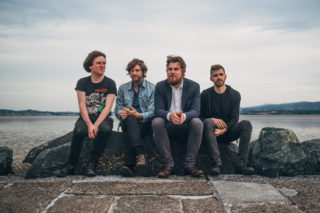
It’s understandable that the band doesn’t want the narrative to be dictated by personal issues because the music they have made is significant. Their second album, The Talkies, comes out in September and it’s knockout – even better than their debut. Whilst Holding Hands With Jamie screeched and clattered and growled and raged in bursts of cacophonic fury, their follow up often does all of that too but it also finds itself in new terrain. A more tonal and atmospheric and ultimately coherent record, over 12 tracks it moves from disorienting waves of guitars that pulse in ways that give the feeling of motion sickness to thick engulfing soundscapes that recall Drums Not Dead-era Liars flipped on its head. Lead single ‘Shoulderblades’ somehow manages to sound like an industrial factory set up in the basement of a techno club with both being operational simultaneously. All of this is filtered through that distinct sound that Girl Band have arrived at: end of the world bass blasts that drone like an air raid siren, Kiely’s ferocious and visceral vocal delivery, gloriously obtuse lyrics, guitars that sound like barbed wire and broken glass, and drumming that remains as solid as it is inventive, going out of its way to avoid the pitfalls of cliché and convention.
Sat in a pub the band tells me about getting back together and how in some ways the long break has benefited the album. “Because we were away and not active in a public sense, it just removed any sense of outside pressure,” says guitarist Alan Duggan. “Or any feeling of: ‘shit we need to get this done by this time.’ It was nice to just be able to write and then record when we were ready. That was a really positive aspect; any momentum that people get when moving onto the second record I imagine it can put a bit of weird pressure on it, but the fact we had that time off and were able to just go back in with no real consideration of what would happen after was really nice.”
Fox echoes this, adding: “It was really liberating because the idea of a timeline was out the fucking window by that stage.”
So what have the band been up to that they are happy to discuss? Duggan has formed a new band, The Claque, which put out its first release earlier this year and is touring; Fox works as a recording engineer and producer and has been working with various bands; and Kiely has just wrapped up a year of college doing peer support in mental health. Drummer Adam Faulkner is absent for the interview due to work. They are all in uniform agreement that they have been supported in their absence too. “Everyone we’ve worked with – agents, publishers, promoters and Rough Trade – have all been incredible and really supportive. Which is amazing,” Duggan says.
So have we reached a stage in which all the talk and conversation and dialogue around mental health in music is leading to meaningful change and actual action, or is there still a lot of work to be done? “I think you have really good organisations like Help Musicians UK,” Duggan says, “which is really positive, and there’s the label in Canada [Royal Mountain Records] that has set aside a therapy budget for their artists, so there’s some positive stuff, but there needs to be a lot more. It’s positive that it’s being talked about a lot more but there needs to be more support – more action. In Ireland they are in the process of setting up the equivalent of Help Musicians UK, which is great, but it’s all a bit late. When you’re a touring artist and you’re not making any money, you live irregular hours and so on – that support shouldn’t be a talking point it should just be a fact of the matter. It’s great that people are talking but the issue of that, and you see it with these panels on mental health, is that it sometimes feels like people are patting themselves on the back because they talked about it, but it’s like, ‘what is actually being done?’”
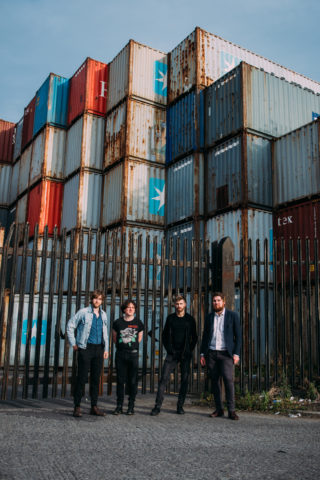
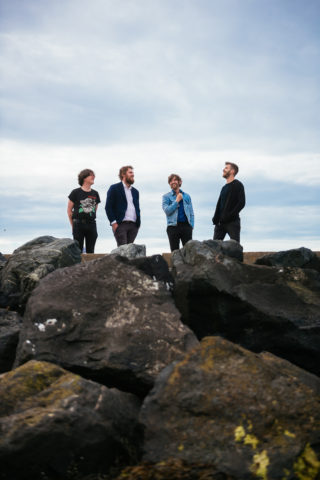
The band’s break from touring and performing live allowed them to recalibrate somewhat. They had three songs from this album already in their live set in 2017, and then throughout 2018 they continued to write more at their own pace. By November they had enough for the album and decamped to a stately home to record for the best part of two weeks. They worked the sound of the house and all its unique sounding rooms into the record, such as all drums being recorded twice, once in the landing and once in the cellar so in mixing the band could cut between the two to shift the sound dynamics.
This kind of detailed experimentation wasn’t unique. For his lyrics Kiely decided to remove pronouns from all songs. “I’d never heard an album that’s ever done that before,” he says looking up from his pint of Guinness. “So my aim was to do the full album like that, which was really difficult.” This approach also allowed Kiely to remove himself from his own head a bit too. “When I was a bit sad or whatever, those words would get in my head: ‘I’, ‘you’, ‘me’. They would have their own meaning and connotations that would continue long after.” In essence, Kiely was trying to write lyrics about a challenging time that wouldn’t put his mind directly back to that place.
“The track ‘Aibohphobia’ is both a palindrome and also means to have a fear of them,” Kiely continues, as he explains his deep plunge into wordplay. They even tried to extend this palindrome exploration further, taking inspiration from Twin Peaks and Michael J Anderson’s backwards-speaking character The Man From Another Place. “He learned what he was saying backwards,” says Fox of the approach David Lynch favoured his actors undertook, rather than just playing the regular recording backwards. “We tried it for a couple of hours but it was like, ‘this is fucking pointless.’” Kiely then starts to try a few of the words he learnt backwards but they mainly come out as nothing but a slurred mumble. Fox did explore the idea further sonically though, learning a guitar riff backwards and recording that alongside the frontwards one “so if you layered them over each other you get the same sequence but it’s backwards and forwards at the same time.”
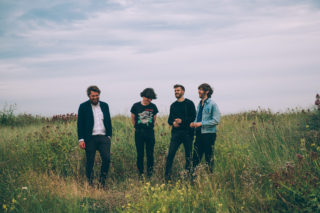
Girl Band’s sources of inspiration and influence have always been a pleasing and eclectic mix. Not to be encumbered by their guitar, bass, drums, vocals set up, back in 2013 they took on techno producer Blawan’s ‘Why They Hide Their Bodies Under My Garage?’ and turned into a noise-rock-techno dropkick of a track. On their latest, classic soul even had an impact. Despite the harsh eruptions that punctuate the album like a head-butt, it flows together lava-like at times, with the band taking inspiration from the production and sequencing of Marvin Gaye’s What’s Going On, specifically the bookending approach he used. Although in the instance of Girl Band, the bookending approach takes the album from panic and anxiety through to calm and clarity.
The Talkies opens with intense and erratic heavy breathing – it immediately feels like being trapped inside a panic attack and that’s because you essentially are. “That was recorded on a weird day,” recalls Kiely. “It was a semi-panic attack thing that was happening at that moment. At first we were like, ‘this is really strange and we don’t know what to do with it’. It’s really intense but pretty early on it was clear it should be the opening of the new album. It freaks people out.” And on the closing track the intensity of the breathing has subsided to a gentle stillness. “So it’s like a musical journey,” Fox says whilst putting on a pisstaking voice whilst also being pretty accurate of the album’s trajectory.
The band are pretty much constantly in piss take mode and it’s one of the reasons that they come across as a bit unwilling when doing photographs. It’s not because they are difficult or diva-ish but they can foresee and smell the cliché of a shit band photo a mile off, and so posed shots, walking shots, climbing on anything is all a big no-no. When they agree to walk on the beach Fox immediately jokes, “it’s too sandy”.
As the photoshoot wraps up outside a storage container site we soon realise there’s no way a taxi is going to drive all the way out here to pick us back up and it’s decided that the 6 of us will cram into Ruth’s little car to the nearest main road and half can get out there and get a cab. Ben, the label’s PR, hops into the boot and curls up like a dog on his way to the beach, Fox sits on Duggan’s lap in the passenger seat and Kiely and I squeeze up in the back with Faulkner, who has since turned up. We drive back past the sewage one more time, having to wind the windows up to avoid the foul stench creeping in. The no seatbelt siren beeps with a constant pulse, almost providing a rhythm to the comical journey before Fox picks up on it and declares, “hey, that sounds a bit like our music.”